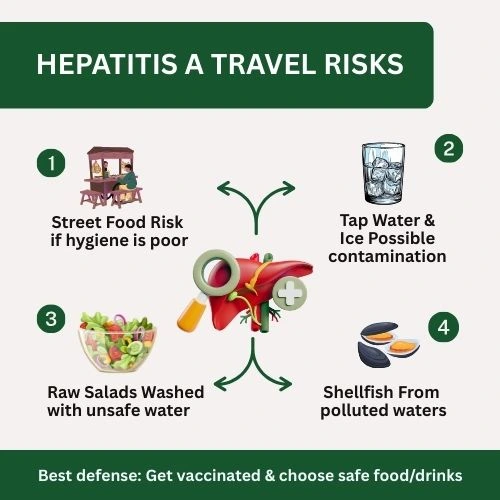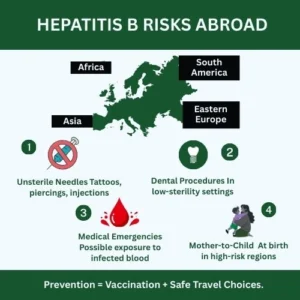Waggon riding is not a primary experience in life, but alongside it is one of the most fabulous aspects of life. This is travel, experiencing new cultures, trying new dishes and visiting mesmerising locations. However, to accompany the excitement, travelling may put you in several health hazards that you might as well have avoided back at home. Hepatitis A and Hepatitis B have been listed among the easy-to-avoid but dangerous risks to international travellers. Both are viral liver infections that could lead to serious disease, long-term health problems and, in some situations, death. So what is the good news? Effective and safe vaccines can prevent them.
And in the list of essentials that you need to carry when travelling before you pack your bags. Here are the reasons why you must protect against Hepatitis A and B.

Hepatitis A
Hepatitis A is a viral disease which sees its infection through contaminated food or water. It is more prevalent in places that have less good sanitation conditions, a point that is usually overlooked by travellers. The virus can occur in the street foods, fresh foods, ice cubes or shellfish despite these being very well-known tourist destinations. Nothing, including your adventurous eating, has to hide you. A salad in a well-established restaurant may be sufficient, provided hygiene is followed.
Hepatitis A can be noted through signs of excessive tiredness, nausea, abdominal pains, fever, and yellowish colour of the skin and the eyes of a person (jaundice). Although the illness only affects most people during weeks or months, it might turn incapacitating and spoil your vacation – or even take effect after you land home.

Hepatitis B
Hepatitis B is a more severe virus, which has been transmitted by coming in contact with infected body fluids, sexual contact, or infected blood. The risks associated with travelling activities include having a tattoo in a foreign country, having a dental or medical procedure in a country with lower health-related standards, or even having small injuries that compel foreign medical assistance. It may also be passed on to the child by the mother at birth.
Chronic liver disease, cirrhosis or liver cancer may be caused by hepatitis B. Hepatitis B can remain in your body forever as compared to Hepatitis A, which has no chronic infection.
Why Travellers Are More at Risk
When one travels, the circumstances encountered are not always familiar, including the health and safety regulations. You can end up drinking tap water in a rural village without knowing it is not safe. Or even that you are in need of medical care. And the equipment is not properly sterilised. Something that is harmless in the comfort of home, such as getting a manicure or piercing, could be made potentially more dangerous in another country.
Moreover, there are locations with significantly higher rates of Hepatitis A and B as compared to others. Africa, Asia, portions of Central and South America and Eastern Europe are among the regions where these viruses are more prevalent, according to the World Health Organisation.
Prevention is greater than healing: Immunisation
Vaccine against hepatitis A
There is a very successful vaccination against Hepatitis A, and that is normally administered twice within a span of six months. A single dose offers powerful protection against the next trip. With the second dose offering long-term immunity, which can last decades.
Hepatitis B Vaccine
The hepatitis B vaccine is normally distributed in three shots taken within a period of six month. But faster schedules are available in case one is travelling soon. After going through the vaccine, it provides a long-term defence to the individual, perhaps lasting a lifetime.
There is also a combined hepatitis A and B vaccine, which is convenient in case you need protection against both viruses with a fewer number of shots.
The correct timing plays a great role.
These vaccinations should also be undertaken at least a month prior to your trip and allow the body to build immunity. But even those who are planning a trip at the last minute might. Some is better than none, and your medical practitioner can expedite things.
Other Prevention Measures
Although vaccination is the best chance of protection, combining it with healthy travel behaviour is the ultimate protection:
- Consume bottled or boiled water.
- Do not eat raw or undercooked meat and shellfish.
- Take precautionary sex.
Vitamin therapy: Do not take unnecessary surgery or cosmetic surgery at risk.
How to keep yourself healthy and safe: the journey
When you contract Hepatitis A or B on the road, it can end the vacation prematurely. Force you into a costly medical payment and leave you with the long-lasting effects. Even worse, you may take the virus home without knowing and expose your loved ones to contracting the virus.
The cost of getting vaccinated is minimal compared to the possible cost in terms of physical, emotional, and economic gain encountered in contracting the illnesses.
Final Thoughts
You may have planned a lot of activities on your travel schedule, but in case you have been ill due to carelessness, it will all go to waste in bed. The hepatitis A and B vaccines do not only apply to those who are adventurous or will be working in remote places. They also are meant to be used by anyone visiting a place where the viruses exist. Which is virtually everywhere, including most tourist destinations.
Go ahead then; prior to hopping on your next flight, book a vaccination. Keep yourself healthy and safe on your adventure. Your future free to look forward to since the best memory is the one you have when you are feeling good.

Leave a Reply